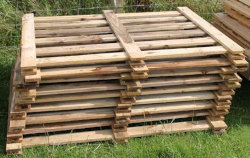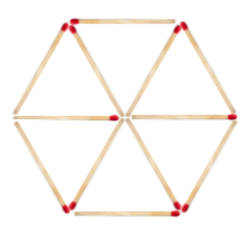Henry’s Puzzles
Henry Ernest Dudeney’s Amusements in Mathematics was published in 1917 in London. Dudeney (1857-1930) was an English Civil Servant who lived in Sussex. When Sam Loyd started sending his puzzles to England in 1893, a correspondence started between him and Dudeney. The two were the main creators of mathematical puzzles and recreations of their day and it was natural that they should exchange ideas. Of the two puzzle experts it was Dudeney who showed the more subtle mathematical skills. Dudeney contributed mathematical puzzles to the UK edition of the Strand Magazine for over 30 years and he was a founding member of the British Chess Problem Society in 1918.

Amusements in Mathematics, page 7
“ ‘Mother, I wish you would buy me a bicycle’ said a
girl of twelve the other day. ‘I don’t think you are old enough yet, my dear’ was the reply.
‘When I am only three times as old as you are you shall have one.’ Now the mother’s age is forty-five.
When may the young lady expect to receive her present?”
Amusements in Mathematics, page 16
A mathematics teacher once posed this puzzle to her class. “By
adding only mathematical symbols and brackets between the numbers on the blackboard, can you make
5 5 5 5 equal 100?”
The answer she gave is: ( 5 + 5) x ( 5 + 5).
Now can you make 1 2 3
4 5 6 7 8 9
equal 100?
Amusements in Mathematics, page 55
“The Farmer’s Sheep Pens”. Farmer Jones built six
equal-sized sheep pens the other day using 13 wooden hurdles.
 In the night one hurdle was stolen but the farmer still wanted
to make six equal-sized pens. He uses matches on the kitchen table to plan how to set out the hurdles. This is how he worked
out the thirteen hurdles.
In the night one hurdle was stolen but the farmer still wanted
to make six equal-sized pens. He uses matches on the kitchen table to plan how to set out the hurdles. This is how he worked
out the thirteen hurdles.
 Can you find the answer for him using only twelve matches?
Can you find the answer for him using only twelve matches?
Amusements in Mathematics, page 109
A shopkeeper has a balance weighing machine like the one shown here.
 He wants to be able to weigh out goods from 1 ounce up to 40 ounces maximum. He can put weights on both scales so, for example,
to weigh out 6oz. of tea he could put a 1oz. weight in the goods pan of the scales and a 7oz. weight in the weights pan.
The puzzle is what is the smallest number of weights he needs to be able to weigh his goods?
”
He wants to be able to weigh out goods from 1 ounce up to 40 ounces maximum. He can put weights on both scales so, for example,
to weigh out 6oz. of tea he could put a 1oz. weight in the goods pan of the scales and a 7oz. weight in the weights pan.
The puzzle is what is the smallest number of weights he needs to be able to weigh his goods?
”

